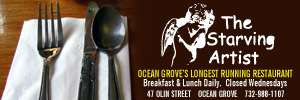Advocacy group seeks higher wages for tipped workers in NJ
Most restaurant employees eligible for tips earn less than $3 an hour
[UPDATE: The Sun received comments from Scott DeFife, executive vice president of policy and government affairs for the National Restaurant Association, after the article was originally published. His statements have been included in this version of the article.]
The state minimum wage for hourly workers increased a dollar this year to $8.25 per hour, however, tipped workers have not seen an hourly wage increase since 1996.
At present, those who work for tips are required to be paid a minimum $2.13 per hour in New Jersey.
Following the results of a study of 100 restaurant workers in Monmouth, Ocean and Atlantic counties that shows 9 out of 10 tipped workers struggle to make ends meet, Women’s advocacy group Wider Opportunities for Women [WOW] is now calling on the help of municipal lawmakers to increase hourly wages for the state’s tipped workers and to put laws into place that give restaurant workers paid sick leave.
The latter part is seen as a public health issue, according to Mary Gatta, a WOW senior scholar and one of the researchers of the study, titled “Down the Shore, Everything’s [Not] All Right: The Economic Insecurity of Restaurant Workers on the Jersey Shore.”
The group released the findings of the study at a press conference held at The Parlour Gallery in Asbury Park last week. Members from WOW and other workers’ advocacy groups were in attendance along with local business owners and politicians.
The report found most restaurant workers earn poverty-level wages, lack access to sick days, experience erratic scheduling, have fewer labor protections and that their industry is rife with sexual harassment, the study states.
According to the study, 92 percent of the workers surveyed do not have access to paid sick days, more than 80 percent said they had worked while sick and nearly half had coughed or sneezed on food. Gatta said a recent report from the Center for Disease Control showed 53 percent of virus outbreaks are from food service workers.
According to the study, 87 percent of the restaurant workers received tips. Of the 87 percent, 82 percent earn a base wage less than $3.50 per hour. Even at the height of the summer season, over one-third of those who earn tips make less than $450 per week.
The group is pushing for legislation that would see the hourly wage for tipped workers increased to 70 percent of the federal minimum wage.
Anastasia Bratt, who works as a bartender in Monmouth and Ocean counties, said while serving and bartending makes her happy, it does not provide her with job security, especially as she gets older.
“No matter how hard you work, there’s always someone younger coming up on your tail,” she said.
Even though the perception that bartenders and servers make a decent amount of money working over the summer months is true, the challenge for shore workers is making that money last over the remaining nine months of the year, she said.
Teófilo Reyes, National Research Director Restaurant Opportunities Center [ROC] United, said the National Restaurant Association under CEO Herman Cain successfully convinced legislators to “delink” hourly wage increases for tipped workers from regular workers in 1996. That year was the last year restaurant workers eligible for tips saw a mandatory wage increase.
The argument against raising the wage is threefold: most tipped workers are teenagers, tipped workers are making “tons” in tips and the industry would collapse if restaurant owners were required to pay higher minimum hourly wages for tipped staff, Reyes said.
A statement on the National Restaurant Association website says restaurants are “labor-intensive businesses that already devote about a third of their sales to wages and benefits” and that “[m]any restaurateurs would be forced to limit hiring, increase prices, cut employee hours or implement a combination of all three to pay for the wage increase.”
“Tips are wages; employees and employers pay taxes on those tip wages,” said Scott DeFife, executive vice president of policy and government affairs for the National Restaurant Association.” Tipped employees at restaurants are among the highest-paid employees in the establishment, regularly earning between $16 and $22 an hour. Nobody is making $2.13 an hour. If an employee’s tips plus their cash wages don’t add up to at least the minimum wage, their employer is responsible for bringing the employee up to the required minimum.”
“Young people across the country look to restaurants for their first jobs. A mandatory wage increase could further restrict opportunities for young and less-skilled individuals,” the website states.
“Dramatic wage increases could significantly limit the entry-level opportunities businesses can provide, and as a result, hurt those without the skills or experience and looking to enter the workforce,” said DeFife.
According to Reyes, the average age of tipped workers is 32, only the top 10 percent of servers and bartenders who work in top tier restaurants earn above average tips and several studies show that restaurants who have increased wages for their tipped workers are thriving.
Local restaurateur Tim McLoone, owner of Tim McLoone’s Supper Club in Asbury Park, has recently increased the minimum hourly wage for non-tipped workers in his restaurants to $10 an hour after taxes and they have eradicated their doctor’s note policy for workers who call out sick.
McLoone, who owns several shore area restaurants, said his company did so after learning the particulars of what it meant to earn a “living wage” by today’s standards.
“I don’t want you to think we are doing some wonderful thing,” said McLoone. “We are just trying to do the right thing.”
[Photo at top: Local restaurant owner Tim McLoone speaks to the crowd at the Wider Opportunities for Women press conference.]
————————————————————
Follow the Asbury Park Sun on Facebook and Twitter.












